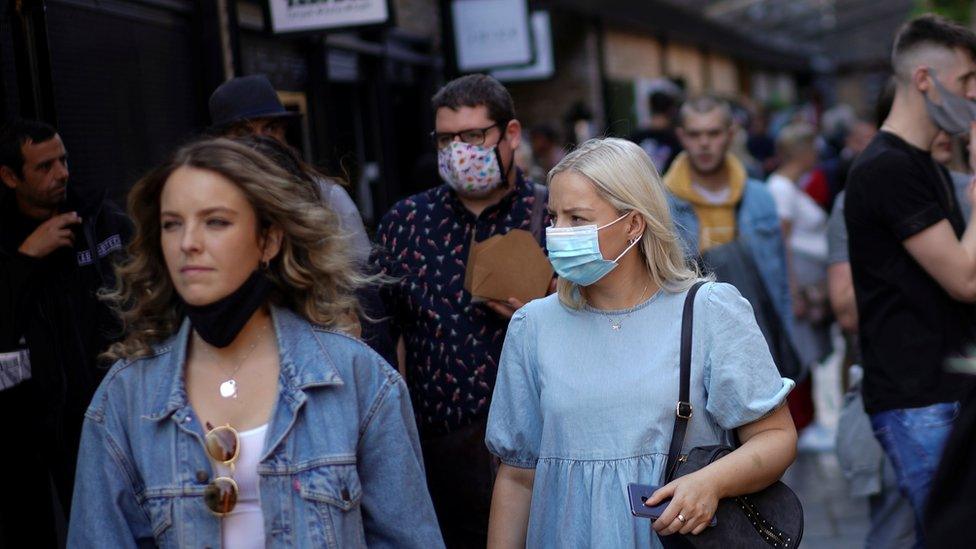Covid lockdown for Newport, Bridgend, Merthyr Tydfil and Blaenau Gwent
- Published
- comments
"Everyone will be affected financially"
Four more counties in south Wales will go into lockdown from 18:00 BST on Tuesday, meaning more than a quarter of the Welsh population will be under tighter restrictions.
Merthyr Tydfil, Bridgend, Blaenau Gwent and Newport follow Rhondda Cynon Taf and Caerphilly county into lockdown.
People will not be able to enter or leave those areas except for a limited number of exemptions, such as work.
Licensed premises such as pubs and bars will need to shut by 23:00 every night.
People will only be able to mix with those not in their own household outdoors - meeting people from extended households indoors will be banned in the four areas.
The pub rule will also be extended to Caerphilly county borough.
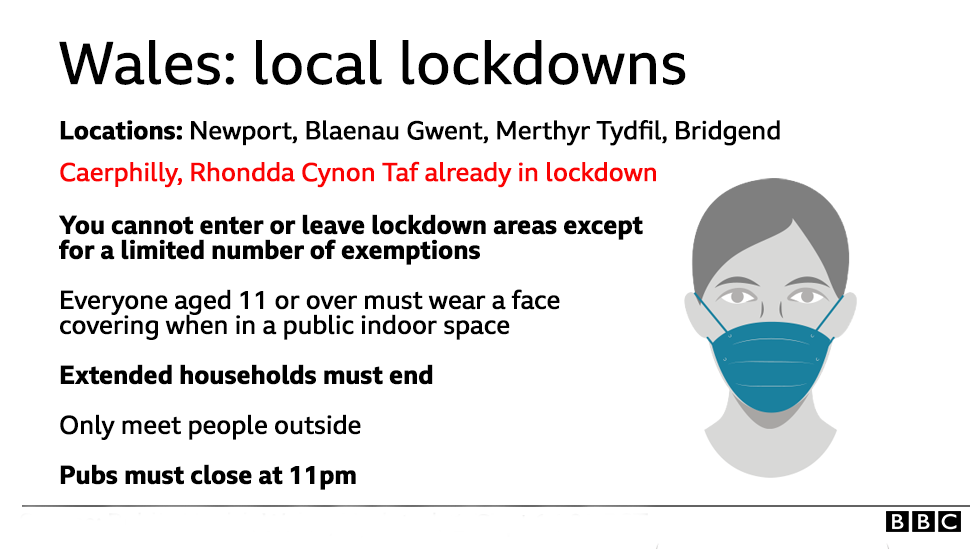
Vaughan Gething, Welsh Government health minister, said there had been a "worrying and rapid rise in cases in four other south Wales council areas - Blaenau Gwent, Bridgend, Merthyr Tydfil and Newport".
"It's always a difficult decision to introduce restrictions but coronavirus has not gone away - it is still circulating in communities across Wales and, as we are seeing in parts of south Wales, small clusters can quickly cause real issues in local communities."
It comes as the UK's four chief medical officers agreed to upgrade the coronavirus alert level from three to four, meaning transmission is "high or rising exponentially".
The new measures affect 431,000 people, meaning that just over 850,000 people in Wales will be under local lockdown from Tuesday.
What are the restrictions?
The rules mean you cannot visit or leave the six counties affected without a "reasonable excuse".
That includes:
For work, if you cannot work from home
For education
For buying essentials like food or medicine
To provide or receive emergency assistance
To meet a legal obligation, and to access or receive public services
To avoid injury or illness or escape a risk of harm
To visit family or close friends on compassionate grounds
Motorists can continue to travel through the areas on the M4 and other roads.
People can continue to meet outdoors in groups of up to 30 people, but cannot meet other households indoors at home or in pubs or restaurants.
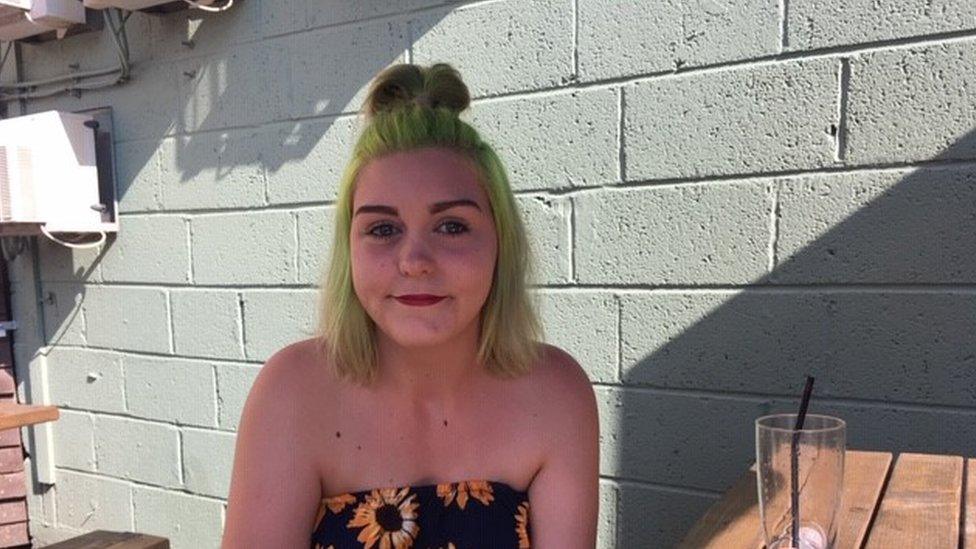
Rebecca James says the pub curfew will not have much of an impact during the week
'People just come out earlier'
Customers at the The Pen and Wig pub in Newport on Monday were not convinced a pub curfew would help to control the virus.
Richard Wooding said the earlier closing time could encourage people to have house parties: "If the bars shut earlier, then people just come out earlier.
"I came out last Saturday, I was appalled at the number of people out. The bar staff can't police it. But I don't think you can stop it. People are just going to party in their own houses."
Another customer, Rebecca James, said: "I don't think there's much of a nightlife here anyway. On the weekends it will affect people, going home early, but during the week everything closes around 11 anyway."
But Justin Cliffe, who runs events for Le Pub, was concerned: "For us as a pub, to close at 11, it's not good. This venue runs until 1am so it's a nightlife spot rather than [somewhere for a] pub lunch.
"So the options that we're discussing are whether the pub closes completely or whether we just revert to doing take out or food for delivery. We're going over the options, but it doesn't look good."
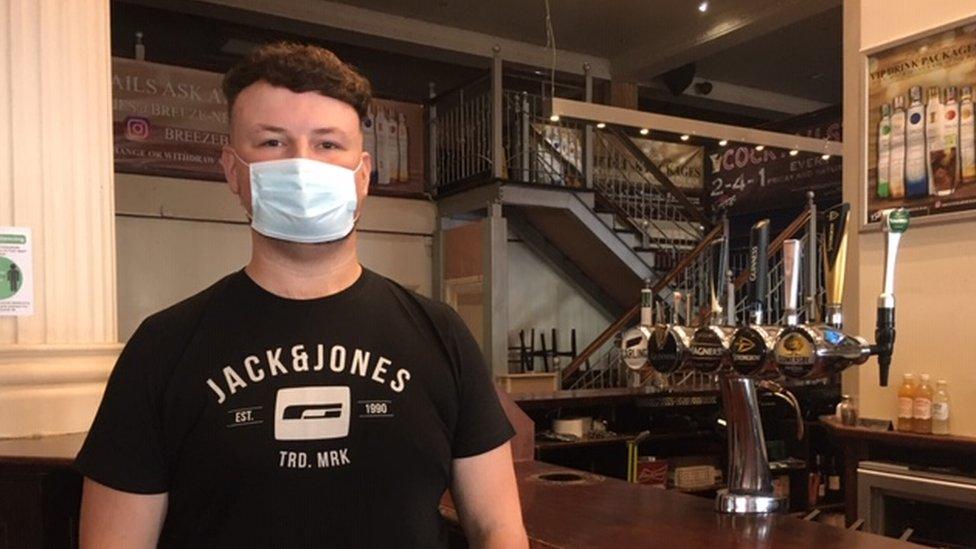
Newport bar owner Jack Bannister fears some customers will stay away
Jack Bannister, who owns Newport bar Breeze, said he was hoping people would make up for the curfew by starting their night earlier, but feared some may stay away altogether.
He said: "Inevitably, I think it will be quieter. In a lot of people's eyes, there will be no point in going out. And with this rule of one household - well that's going to be impossible."
The bar had to shut earlier this month after a customer tested positive for Covid-19.
"We were doing really well before that happened," he said. "We did the responsible thing we felt, by informing our Facebook page".
"But there's always going to that stigma - that Breeze had a case, do I want to go there and catch it? Even though it's not our fault."
Newport Live, which runs Newport council's leisure facilities, said it will turn away people who are not from the city with the exceptions for elite athletes and people with specific health or mobility issues.
What are the figures?
On Monday, Public Health Wales (PHW) said there had been a further 234 cases of people with coronavirus, but no new deaths.
Of these, 40 were in Rhondda Cynon Taf, 20 in Blaenau Gwent, 15 in Caerphilly, 14 in Bridgend, 12 in Merthyr and 11 in Newport.
In the past seven days, the number of people with the virus per 100,000 of the population was 102.8 in Merthyr, 83.3 in Rhondda Cynon Taf, 60.1 in Blaenau Gwent, 53 in Caerphilly and Bridgend and 45.3 in Newport.
The threshold for the UK government to consider triggering quarantine conditions for people returning from countries outside of the UK is 20.
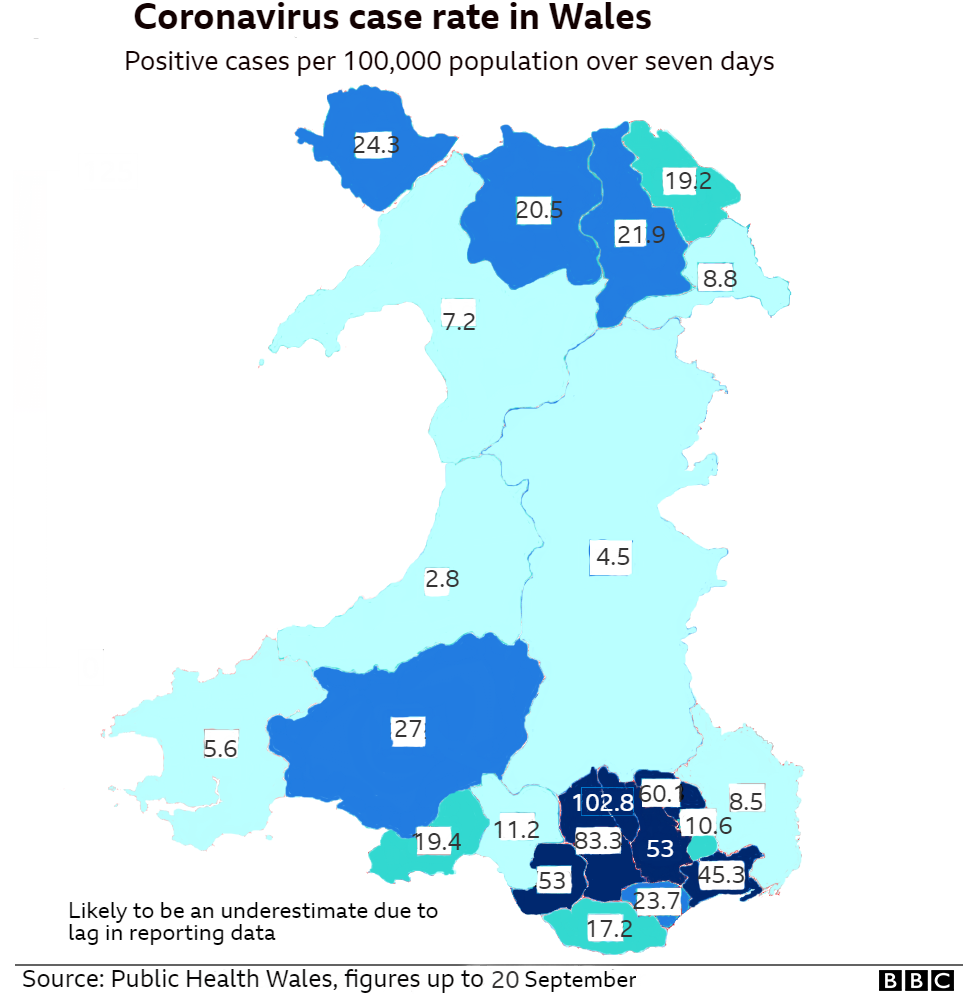

PHW figures showed in the week from 16-22 March, when national lockdown was announced, there were 393 cases in Wales, with a case rate of 12.5 per 100,00 people.
Last week, 14-20 September, there were 921 cases and a case rate of 29.2 per 100,000 people.
On Monday, speaking at a Downing Street briefing, Chief Medical Officer for England Prof Chris Whitty said the rising case numbers could not be blamed on an increase in testing as there was also an "increase in positivity of the tests done".
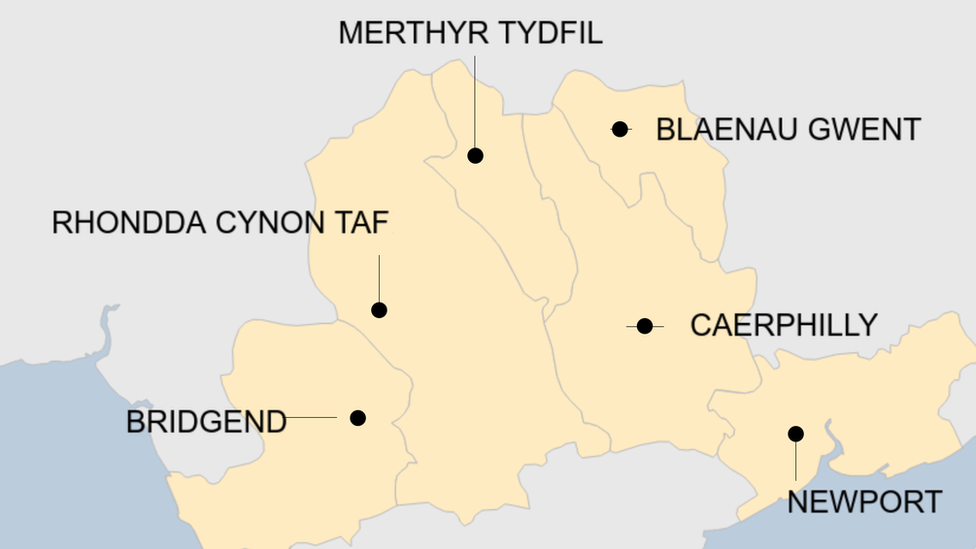
Could there be wider regional restrictions?
At a press conference Mr Gething said he would hold "an urgent meeting" on Tuesday with councils, health boards and police forces from Bridgend to the English border.
It will discuss the wider regional situation and whether further measures are needed.
Earlier, senior UK government advisers warned of a "six-month problem" of rising cases. Mr Gething said he could not "definitively" give a timescale of how long lockdown measures would be needed.
He said "all-Wales" measures may be needed to tackle the virus.
But Mr Gething said such action may be short of the full lockdown imposed on 23 March.
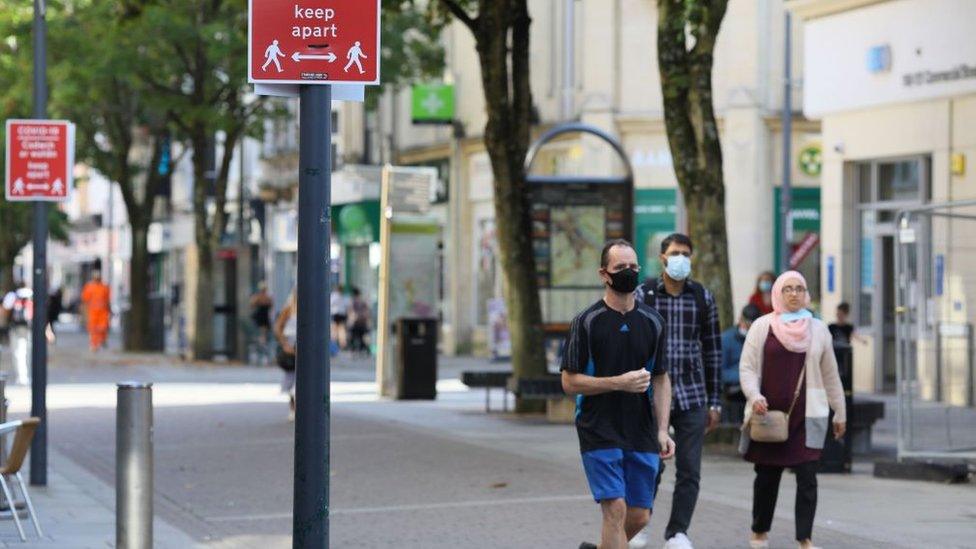
Newport is seeing a "wide spread of cases", Mr Gething said
A call between Prime Minister Boris Johnson and Wales' First Minister Mark Drakeford took place on Monday afternoon.
A Welsh Government spokesman said the pair "agreed on the need to work on a four-nation basis to discuss UK-wide measures where these were necessary".
Mr Drakeford is due to take part in a Cobra meeting on coronavirus with UK and devolved government ministers on Tuesday.
Downing Street, which also held calls with senior ministers from Scotland and Northern Ireland, said the prime minister was taking the rising infection rate "very seriously".
"He reiterated his unwavering commitment to working with the devolved administrations as we continue to tackle the virus," a spokesman said.
"They all agreed to act with a united approach, as much as possible, in the days and weeks ahead tomorrow to discuss next steps for the country."
What is the political reaction?
Welsh Conservative health spokesman Andrew RT Davies called for "smart, hyper-local lockdowns".
"Ministers and governments must do everything possible to avoid another blanket national lockdown as the other public health and economic impacts would be disastrous," he said.
His Plaid Cymru counterpart Helen Mary Jones called for furlough to be extended to support local lockdowns.
"If Westminster won't extend furlough scheme to support local lockdowns, then the Welsh Government needs to look at what support they might be able to provide," she said.
UK Health Secretary Matt Hancock said the UK government would be introducing a new isolation support payment for people on low incomes in England who could not work because they had tested positive or were asked to self-isolate.
He said funding would be provided to the devolved administrations so similar support could be offered to people in Scotland, Wales and Northern Ireland.
Mr Gething said once the Welsh Government had seen the detail of the funding, it would decide how to spend the money.
- Published10 October 2020
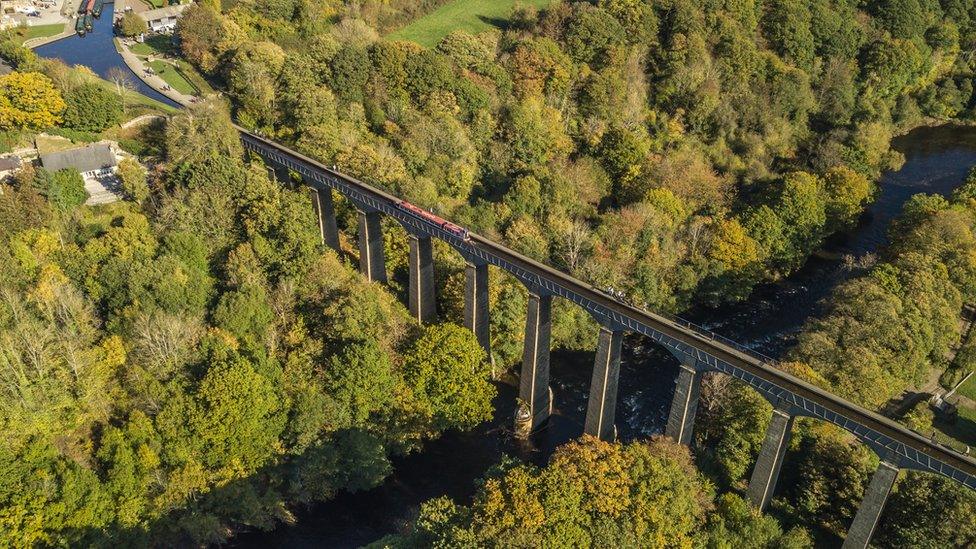
- Published21 September 2020
